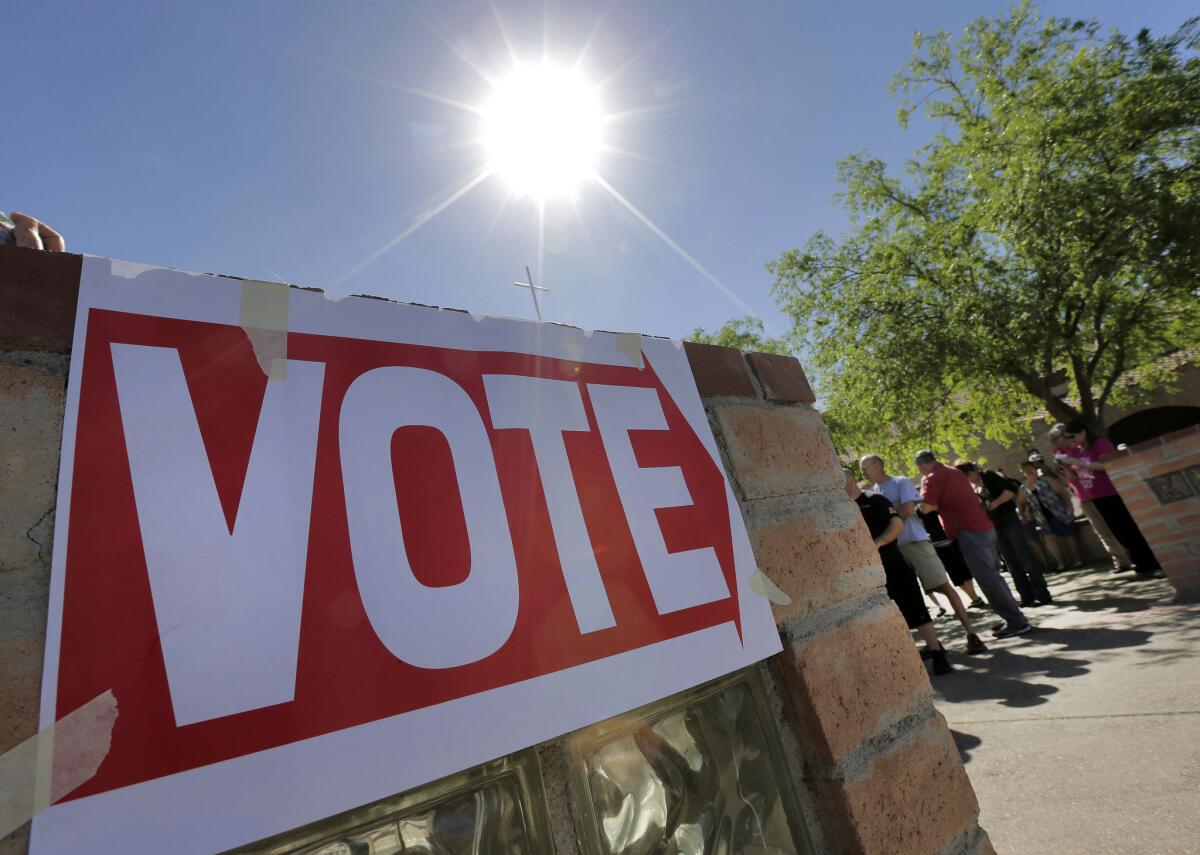Trump takes Arizona Republican primary; Cruz comes out on top in Utah caucuses

Republican voters in Arizona and Utah went to the polls Tuesday.
Donald Trump rolled to another big victory Tuesday in Arizona, inching closer to the delegates he needs to capture the Republican presidential nomination without a contest at the party’s national convention this summer.
With nearly-two thirds of the vote counted, Trump was crushing Ted Cruz and John Kasich, his remaining GOP rivals, giving him all 58 of Arizona’s delegates and pushing him more than halfway to the 1,237 needed to mathematically clinch the nomination.
Texas Sen. Cruz won the Utah caucuses, the day’s other contest, and took all 40 delegates and slowed Trump’s progress before his lead becomes insurmountable.
After weeks of cross-country balloting with hundreds of delegates in play, Tuesday’s stakes were comparatively meager, and the results were starkly overshadowed by the terrorist attacks in Belgium.
Hours before the polls opened, a series of bombs shook Brussels, killing at least 30 people and immediately thrusting the issue of terrorism and national security to the fore of the presidential campaign.
Taking to the airwaves, Trump reiterated his proposal for an open-ended ban on Muslims entering the United States and for using extralegal means in the fight against terrorism.
On CNN, Trump called for torturing Salah Abdeslam, a suspect in November’s terrorist attack on Paris who was captured last week in Belgium.
“You know, he may be talking, but he’ll talk a lot faster with torture,” Trump said.
Cruz responded with his own provocative proposal, calling for law enforcement authorities “to patrol and secure Muslim neighborhoods before they become radicalized.”
“For years, the West has tried to deny this enemy exists out of a combination of political correctness and fear,” he said, blaming the attacks on “a toxic mix of migrants who have been infiltrated by terrorists, and isolated, radical Muslim neighborhoods.”
Ohio Gov. Kasich, characteristically, was more restrained. “We are not at war with Islam,” he said. “We’re at war with radical Islam.”
Entering the day’s contests, Trump had 681 delegates, Cruz 425 and Kasich 143, and the only question seemed to be how much the Manhattan real estate mogul would pad his lead.
Arizona, which borders Mexico, was seemingly tailor-fit for Trump’s pugnacious position on immigration; the wall he proposes to build on America’s southern border would run, in part, through Arizona’s Sonoran Desert.
For years, the state stood at the epicenter of efforts to stop people entering the United States illegally, passing one of the most aggressive laws in the country, and Trump campaigned with two of the leading hard-liners on the issue, former Arizona Gov. Jan Brewer and Maricopa County Sheriff Joe Arpaio.
“So many killings, so much crime, drugs pouring through the border.... We’re going to build the wall, and we’re going to stop it,” Trump said to loud, sustained cheers at a weekend rally in the Phoenix suburbs. “It’s going to end.”
But more than any issues, Trump’s brief campaign in Arizona was marked by another outbreak of violence, this time on Saturday at a Tucson rally, where a heckler was beaten in full view of television cameras. Trump responded by praising the assailant and criticizing demonstrators and the media for, he said, distorting the coverage.
The incident seemingly did little to diminish Trump’s support.
Cruz had hoped to pull off an upset in Arizona, campaigning hard in the state. But he was undermined by early voting, which started Feb. 24.
Sen. Marco Rubio of Florida, who quit the contest last week after losing his home state, was capturing nearly a fifth of the vote, support that otherwise might have gone to Cruz.
Utah, with its sizable Mormon population, presented the more competitive contest and the best hope for anti-Trump forces to slow his momentum and force a contested convention this summer, which appears to be the only way to stop him from topping the Republican ticket in the fall.
Utah was the rare state where Trump entered election day as a decided underdog. For one thing, his disparagement of immigrants and exclusionary talk of banning Muslims have not gone over well in a state built by newcomers fleeing religious persecution.
His boorish behavior also offended many in the buttoned-down state. Just last week on a swing through Salt Lake City, he questioned the religious faith of Mitt Romney, a part-time Utah resident and favorite son. (Trump later said he was joking, but otherwise stood by his harsh criticism of the 2012 GOP nominee.)
Romney, who has sharply denounced Trump and backed Kasich in last week’s Ohio primary, said he would vote for Cruz as part of an effort to deny Trump the nomination.
“The only path that remains to nominate a Republican rather than Mr. Trump is to have an open convention,” he wrote in a posting on Facebook. “At this stage, the only way we can reach an open convention is for Senator Cruz to be successful in as many of the remaining nominating elections as possible.”
Cruz won 69% of the Utah vote, which entitled him to all of the state’s delegates.
Kasich campaigned aggressively in Utah and picked up a few endorsements. But he did not come close to winning either state Tuesday. His victory last week at home in Ohio remains his only first-place finish of the Republican contest.
After Tuesday, the campaign enters a lull of sorts. There will be no Republican contests until April 5, when Wisconsin awards its 42 delegates.
More to Read
Get the L.A. Times Politics newsletter
Deeply reported insights into legislation, politics and policy from Sacramento, Washington and beyond. In your inbox three times per week.
You may occasionally receive promotional content from the Los Angeles Times.












